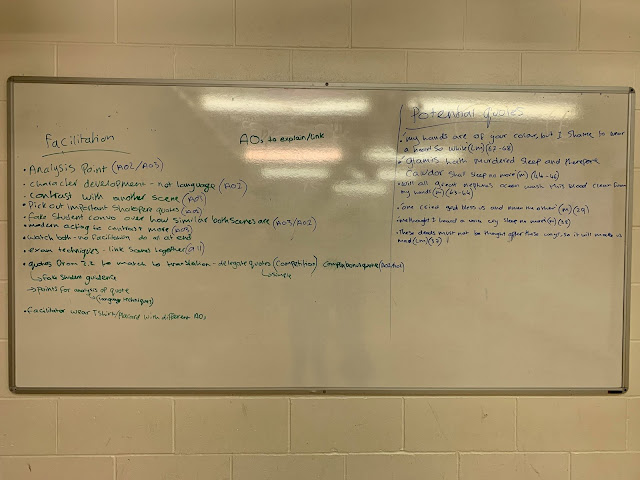The modern-day English version runs thus:
LM: The wine that we have drunk has made them weak but me brave, I can do this, I'm ready. Nothing can stop me. (Gasp). Okay, it was just an owl. Macbeth is doing it, everything is ready. The doors are open. I've drugged them, they have no idea what's going on.
M: Who's there? Tell me!
LM: Oh my god, are they awake? If we get through this, if nobody sees him going in or out, we'll be okay. (Listening). I've put everything our there's no way he could have missed the daggers. I would've killed Duncan myself if he didn't look like my dad whilst sleeping.
(Enter M).
LM: Macbeth.
M: I've done it, didn't you hear?
LM: I heard an owl, nothing unusual. Didn't you just call out?
M: When?
LM: Just now.
M: Yes, when I came back.
LM: Yeah.
M: Shh. Who's sleeping next door to Duncan?
LM: Donalbain.
M: This is a sorry sight.
LM: Don't talk like that.
M: One laughed and one shouted murder. I heard them wake each other up but they said their prayers and then went back to sleep.
LM: There's two in the same room.
M: They shouted 'God bless' and 'Amen'. It was like they had seen the blood on my hands so I could not say Amen back.
LM: Stop overthinking.
M: Why couldn't I say amen? I needed to say it for God's forgiveness but I couldn't.
LM: We shouldn't think about it. It'll make us crazy.
M: I thought I heard someone say Macbeth murders sleep. Sleep that is healing and pure and soothing and necessary for life.
LM: What do you mean?
M: The voice shouted throughout the house, sleep no more. Thane of Glamis has murdered sleep, therefore, Cawdor cannot sleep. Macbeth cannot sleep.
LM: Who said that? Why are you thinking about it so much? Go and get some water and wash the blood from your hands. Why did you bring the dagger back? They must stay there. Go and take them back and cover the guards with his blood.
M: I'm not going back, I'm afraid of what I have done, I don't want to see his dead body again.
LM: You coward! Give me the daggers. The sleeping and the dead look the same but only children fear the dead. If he bleeds I'll smear the blood on the guards because they need to look like the murderers.
(LM exits).
M: Wait, can you hear knocking? Why does every noise scare me? I don't even recognise myself. Even holy water couldn't clean my hands, I'd just turn it red.
(Enter LM).
LM: My hands now have blood on them - stop being so pathetic. I can hear knocking at the south door. Let's go to bed and wash our hands. It's easy. You've lost your mind, stop daydreaming. Listen. More knocking. Put on your nightgown, let's act like it didn't happen in case someone comes to get us it looks like we've been asleep. Snap out of it.
M: I can't believe what I've done. I wish that knocking would wake Duncan, I would wake him if I could.
There was much discussion about how to facilitate the scene and it took on the form of a debate about how similar Act 1, Scene 7 and Act 2, Scene 2 were in terms of character development. The image below shows our different ideas about how we could facilitate this scene and indeed future scenes in the piece:
I led the debate on the similarities between 1,7 and 2,2. I suggested that maybe we shouldn't focus on these scenes because of the lack of character development which is what we were trying to achieve with the piece and how different elements caused Macbeth to turn from hero to villain. The lack of change was disturbing. The argument that Peter put forward was that this scene was to show the impact that Lady Macbeth had on Macbeth. I countered this by suggesting that this was precisely what we were doing in 1,7 so didn't see why there was a need to repeat the exercise in a new way. To be honest, I'm still quite confused. Nevertheless, it was decided that we would facilitate 1,7 to show Macbeth's character and 2,2 to show the impact Lady Macbeth would have on Macbeth.
The video below shows the facilitation that I took part in:
The main idea that we were trying to get across was the use of Shakespearean quotes and what they mean in modern-day English. This would enable our TA to better understand the quotes we have chosen - the ones from the video are vital quotes from Act 2, Scene 2 which could be used in an essay on this subject - and will aid them in their exams. The idea of splitting our TA into teams allows for better cooperation and for them to stay involved in the piece rather than drift off elsewhere. The interactiveness and humour imbued into the scene means that our TA will want to stay involved and makes our job as facilitators much easier than before.
Mr Jones, an English teacher and thus part of our client base, joined us in the latter part of the lesson and watched the two facilitations on offer. The video below shows the discussion that we had with him. It confirmed that what we were doing was what our client would want from the piece:


No comments:
Post a Comment